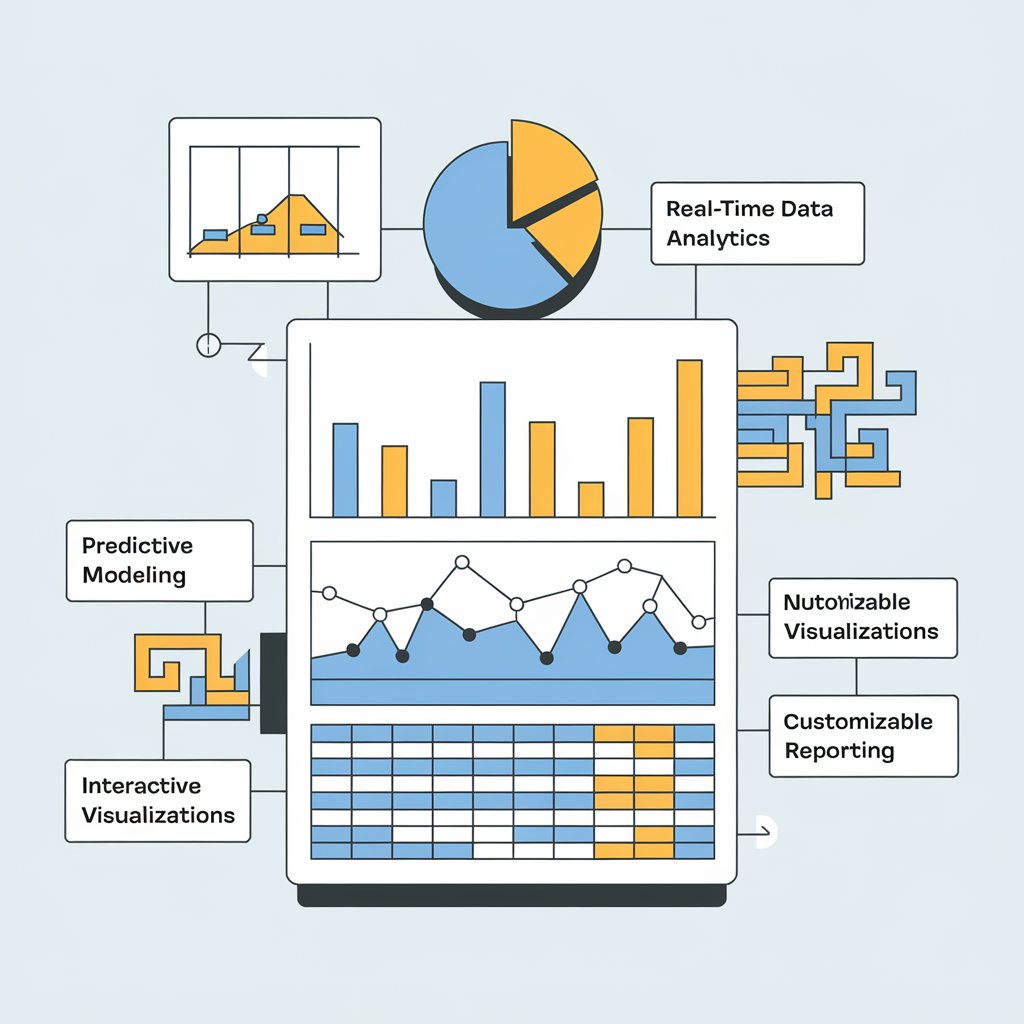The Benefits and Examples of Business Intelligence Solutions

In today’s data-driven business landscape, you need every advantage to stay competitive. Business intelligence (BI) solutions offer powerful tools to transform raw data into actionable insights, empowering you to make informed decisions. By leveraging BI, you can uncover hidden patterns, identify emerging trends, and optimize operations across your organization. From interactive dashboards to predictive analytics, BI solutions provide a comprehensive view of your business performance. Business Associates use predictive tools to make an informed decision.
In this article, we’ll explore the key benefits of implementing Business Intelligence Solutions and discover real-world examples of how companies are using these solutions to drive growth, increase efficiency, and gain a strategic edge in their industries.
What are Business Intelligence Solutions?
Business Intelligence (BI) solutions are powerful tools that transform raw data into actionable insights for organizations. These sophisticated systems collect, process, and analyze vast amounts of information from various sources, presenting it in easily digestible formats like dashboards, reports, and visualizations.
BI solutions enable companies to make data-driven decisions by providing a comprehensive view of their operations, market trends, and customer behavior. They integrate data from multiple departments, creating a single source of truth that enhances collaboration and strategic planning.
Key features of BI solutions include:
- Real-time data analytics
- Predictive modeling
- Interactive visualizations
- Customizable reporting
By leveraging these capabilities, businesses can identify opportunities, mitigate risks, and gain a competitive edge in today’s data-driven landscape.
Key Features to Look for in a Business Intelligence Solution
When evaluating Business Intelligence (BI) solutions, consider these crucial features:
- Data Integration: Look for platforms that can seamlessly connect to multiple data sources, including databases, cloud services, and applications.
- Advanced Analytics: Ensure the solution offers predictive and prescriptive analytics capabilities to uncover deeper insights.
- Customizable Dashboards: Seek tools with intuitive, drag-and-drop interfaces for creating personalized visualizations.
- Mobile Accessibility: Choose a platform that provides responsive design for on-the-go access to reports and dashboards.
- Real-time Reporting: Opt for solutions offering live data updates to support timely decision-making.
- Collaboration Features: Select tools that enable easy sharing and commenting on reports within teams.
- Scalability: Ensure the BI solution can grow with your business, handling increasing data volumes and user numbers efficiently.
Examples of Business Intelligence Solutions

Business intelligence solutions run the gamut from basic reporting and dashboard tools to advanced analytics platforms. Here are 7 examples of popular BI solutions:
- Tableau: This user-friendly solution provides interactive data visualizations, dashboards, and reporting capabilities. It’s ideal for businesses looking for easy-to-use BI capabilities.
- Microsoft Power BI: An accessible and powerful BI tool from Microsoft, Power BI enables users to connect to hundreds of data sources and create interactive reports and dashboards.
- Qlik: Qlik’s solutions offer in-memory analytics, interactive dashboards, and data integration features. The platform is customizable and scalable for growing organizations.
- SAP BusinessObjects: SAP’s comprehensive BI suite provides reporting, dashboards, planning, predictive analytics, and data integration. It’s designed to support enterprises with complex needs.
- Oracle BI: Oracle’s Business Intelligence Enterprise Edition offers analytics, reporting, dashboards, planning and predictive capabilities. It integrates with Oracle databases and cloud services.
- IBM Cognos Analytics: IBM’s BI solution provides reporting, dashboards, planning, predictive analytics, storytelling and data integration features. It can scale from departments to the enterprise level.
- Domo: This cloud-based BI platform offers data visualization, reporting, analysis and machine learning capabilities. Domo prioritizes ease of use and quick time to insight.
How Business Intelligence Solutions Help Companies
Business Intelligence (BI) solutions empower companies to make data-driven decisions, enhancing operational efficiency and strategic planning. By consolidating and analyzing vast amounts of data from various sources, BI tools provide actionable insights that drive business growth.
Improved Decision-Making
BI solutions offer real-time analytics and customizable dashboards, enabling executives to quickly identify trends and make informed choices. This data-centric approach minimizes guesswork and reduces the risk of costly mistakes.
Operational Efficiency
By streamlining data processing and reporting, BI tools save time and resources. Automated reports and intuitive visualizations allow teams to focus on strategy rather than data compilation, boosting overall productivity.
Competitive Advantage
Companies leveraging BI solutions gain a significant edge in the market. These tools help identify new opportunities, optimize pricing strategies, and enhance customer experiences, leading to increased market share and profitability.
How to successfully implement a BI Solution in your company
To successfully implement a BI solution in your company, follow these procedures:
Assess Your Needs
Begin by evaluating your organization’s specific requirements. Identify key performance indicators (KPIs) and data sources crucial for decision-making. This assessment will guide your BI solution selection.
Choose the Right BI Tool
Research and select a BI solution that aligns with your needs. Consider factors such as scalability, user-friendliness, and integration capabilities with existing systems.
Prepare Your Data
Ensure data quality and consistency across all sources. Implement data cleansing and standardization processes to create a reliable foundation for your BI solution.
Train Your Team
Provide comprehensive training to end-users and IT staff. This step is critical for maximizing the value of your BI investment and ensuring widespread adoption throughout the organization.
Benefits of Implementing Business Intelligence Solutions
These are some of the benefits of Implementing business intelligence solutions:
- Identification of growth opportunities
- Risk management through detection of anomalies and issues early on
Enhanced Decision-Making
Business Intelligence (BI) solutions empower organizations with data-driven insights, enabling faster and more accurate decision-making. By providing real-time analytics and visualizations, BI tools help executives identify trends, spot opportunities, and mitigate risks more effectively no matter the line of business.
Improved Operational Efficiency
BI solutions streamline data collection and analysis processes, reducing manual work and minimizing errors. This increased efficiency allows teams to focus on strategic tasks rather than data gathering, ultimately boosting productivity and reducing operational costs.
Better Customer Understanding
By analyzing customer data, BI tools offer valuable insights into consumer behavior, preferences, and patterns. This deep understanding enables businesses to tailor their products, services, and marketing strategies to meet customer needs more effectively, enhancing satisfaction and loyalty.
What Industries Can Benefit Most From Implementing Business Intelligence Solutions?
While BI solutions can benefit organizations across various sectors, industries such as retail, healthcare, finance, and manufacturing often see significant improvements in performance and profitability through the strategic use of data-driven insights.
Choosing the Right Business Intelligence Solutions
Selecting the optimal Business Intelligence (BI) solution is crucial for maximizing your organization’s data-driven decision-making capabilities. Begin by assessing your company’s specific needs, considering factors such as data volume, complexity, and desired insights. Evaluate potential solutions based on their scalability, user-friendliness, and integration capabilities with existing systems.
Key Considerations
- Functionality: Ensure the solution offers robust data visualization, reporting, and analytics features.
- Customization: Look for platforms that allow tailoring to your unique business processes.
- Security: Prioritize solutions with strong data protection measures and compliance features.
Remember, the right BI solution should align with your long-term strategic goals while providing immediate value through actionable insights. By carefully weighing these factors, you’ll be better equipped to select a Business Intelligence solution that drives your organization’s success.
How Much Does Business Intelligence Cost?
The cost of BI solutions depends on various factors like:
- Scope of deployment
- Features and functionalities
- Implementation and support services
- Licensing and subscription models of different vendors
In general, the total cost of ownership for BI solutions ranges from a few thousand dollars for basic tools to millions of dollars for enterprise-wide deployments. However, the benefits of BI in terms of improved decision-making and efficiency can far outweigh the costs.
Best Practices for Adopting Business Intelligence Solutions
These are some of the best practices for adopting business intelligence solutions:
Define Clear Objectives
Begin by establishing specific, measurable goals for your BI initiative. Align these objectives with your overall business strategy to ensure meaningful outcomes.
Ensure Data Quality
Implement rigorous data cleansing and validation processes. High-quality data is crucial for accurate insights and decision-making in Business Intelligence Solutions.
Foster a Data-Driven Culture
Encourage widespread adoption of BI tools across your organization. Provide training and support to empower employees at all levels to leverage data in their daily work.
Choose Scalable Solutions
Select BI platforms that can grow with your business. Scalability ensures your investment remains valuable as data volumes and user needs expand over time.
Prioritize User Experience
Opt for intuitive, user-friendly BI tools. Easy-to-use interfaces promote higher adoption rates and more effective utilization of Business Intelligence Solutions.
Implement Strong Security Measures
Protect sensitive data with robust security protocols. Ensure compliance with relevant regulations and maintain user trust in your BI system.
Continuously Evaluate and Improve
Regularly assess the performance and impact of your BI solutions. Stay open to feedback and be prepared to refine your approach for optimal results.
Conclusion
In conclusion, business intelligence solutions offer tremendous value for organizations seeking to leverage their data for strategic advantage. By implementing BI tools and processes, you can unlock actionable insights, improve decision-making, and drive better business outcomes across your enterprise. From interactive dashboards to predictive analytics, the examples discussed demonstrate the wide-ranging capabilities of modern BI platforms.
As data continues to grow in volume and importance, investing in robust BI solutions will be critical for maintaining competitiveness. By embracing data-driven approaches enabled by BI, you position your organization to thrive in an increasingly complex and fast-paced business landscape. The future belongs to companies that can harness the full potential of their information assets through intelligent BI implementations.



